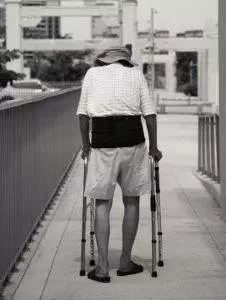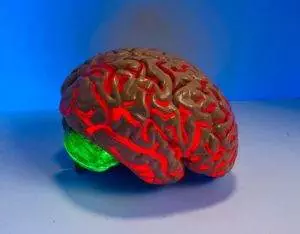By Qineng Tan, L.Ac, Ph.D. & Xiaomei Cai, L.Ac., Ph.D.

Can acupuncture help stroke recovery? After even a mild stroke, people will often have many problems: weakness in parts of the body, pain or tingling in hands, arms or legs, lack of awareness (or neglect) of parts of the body, memory loss, and slurred speech. There can also be emotional and mental health issues after a stroke, like depression, anxiety, or anger. Stroke recovery acupuncture can have a positive impact on balance, coordination, and overall sense of wellbeing.
A stroke is a medical emergency event that occurs when the flow of blood to some part of the brain is blocked, starving that part of the brain of the oxygen and nutrients it needs to function. Sometimes this happens because of a burst blood vessel (hemorrhagic stroke), or a blood clot (ischemic stroke) creating the blockage. A “mini stroke,” or transient ischemic attack, is when blood flow is only compromised for a few minutes, and then the situation improves. Without adequate blood flow, brain cells deteriorate and die very quickly. Any type of stroke is very dangerous to a person’s health and requires immediate medical care. Even in the case of a mini stroke, or mild stroke, a person must seek care to check for damage and to help prevent a stroke from occurring again.
Strokes are one of the leading causes of death and disability worldwide. Many people who suffer a stroke end up losing some of their physical and mental faculties, sometimes experiencing seizures. How a person goes through the recovery process after a stroke can make a huge difference in the ultimate outcome. Typical post-stroke treatment includes physical therapy to help people regain motor function.
The human brain is actually amazingly able to regenerate itself, given the appropriate nourishment and circumstances. With good nutrition and the right exercise, blood vessels will rebuild themselves, and new neurons (specialized brain cells) will be created. It is vital, though, that the flow of nutrient-rich blood to the brain is maximized, and that a person is motivated and able to work through the difficulties of retraining the brain and body to function.
This is where TCM and acupuncture come in. Acupuncture treatment works to enhance the flow of Qi and blood to blocked areas of the body, while TCM herbs are carefully chosen to provide nutrients people may not be able to get from foods. Acupuncture helps reestablish connections in the nervous system, and stimulates muscle and organ tissues to aid in healing after stroke.
How To Tell If You’re Having a Stroke
“Am I having a stroke?” It’s important to review the signs of a stroke, so that if you or someone close to you could be having a stroke, you can act quickly to get help. If you are having a stroke, seeking immediate medical attention is crucial. A stroke causes damage to brain cells, so every moment is critical when it comes to surviving a stroke and maintaining functional abilities.
“FAST stroke” is the first way to tell if someone is having a stroke; start by remembering the acronym FAST for stroke test:
- F – Face drooping, often on one side, mouth especially looks lopsided
- A – Arm weakness, usually on one side, person cannot lift arm, or it feels numb
- S – Speech difficulty – speech is slurred, or the person is unable to speak or has trouble forming thoughts into words (aphasia)
- T – Time to call 911. If a person shows the signs of stroke, they need medical attention right away. Get them to the emergency room as quickly as possible.

Depending on where in the brain the stroke has occurred, symptoms will vary somewhat. A stroke that occurs in the right hemisphere in the brain will cause weakness and numbness on the left side of the body. It may also affect a person’s ability to recognize what is going on with the weakened parts of the body; this is what we call “neglect.” Visual and/or spatial impairment are common signs of right side stroke; it may be hard to see or find things.
Strokes on the left side of the brain cause weakness on the right side of the body, and may also impair vision and/or the ability to orient oneself in space. The ability to reason, read, and perform mathematical calculations may be impaired. Left side stroke is more likely to cause feelings of depression and change a person’s personality so that they become more anxious and hesitant.
Once a person has been gotten to medical help, health care providers use the NIH stroke scale to assess how severe the stroke is. In some cases the use of anti-clotting medications will restore blood flow to the affected area. This works best if the patient can be given this medication within three hours of the beginning of the stroke. Other times, a procedure called a thrombectomy may need to be performed, in which a surgeon will remove the clot with a thin catheter instrument. In the case of a hemorrhagic stroke, patients may require surgery or a blood transfusion to manage bleeding in the brain.
Can Acupuncture Help Prevent Stroke?

A stroke occurs in the brain, but from the TCM perspective, the problem doesn’t begin or end in the head. A stroke is the result of disruption of the normal flow of blood and Qi in the body, and some type of inciting event causing the blood to rush suddenly upwards into the head. A stroke is often the result of conditions in the body that have developed over time, but then too much stress or an emotional upheaval causes the immediate emergency event of a stroke.
Western medicine views high blood pressure as one of the main factors that can lead to stroke. So, while an acupuncturist also views stroke as being related to problems with the movement of blood, we have concepts that explain what problems within the body are causing the impeding of proper flow. According to TCM, stroke happens due to internal factors of deficiency, stagnation, fire/heat, phlegm and wind:
- Yin Deficiency – especially affecting the liver and kidney systems. This happens often due to behaviors like staying up late, not getting enough sleep, and eating more heat-producing foods.
- Heat – strong emotions of anger and frustration, due to stress and conflict, can contribute to a build up of too much hot energy in the body, especially impacting the heart and liver.
- Phlegm – another internal factor, the formation of phlegm in the body can happen due to unhealthy eating habits. The build up of phlegm particularly affects the spleen and contributes to post-stroke problems with speech, numbness in the limbs, and mental fog.
- Stagnation – this refers to blood and/or Qi being stuck, unable to flow freely through the vessels and meridians. Acupuncture treatment and exercise can help get Qi and blood moving again.
- Wind – In TCM, Wind is a pathogenic factor that can enter the body from the outside environment (external), or wind can be an internal factor, generated within the body. In the case of stroke, internal wind is considered to be the cause of a person losing their conscious awareness of their body and becoming mentally disconnected and/or physically paralysed.
Cupping may be used in addition to acupuncture to aid stroke recovery. Cupping increases blood flow and may be helpful in particular for one of the lesser known symptoms following a stroke: persistent hiccups.
Stroke Rehabilitation Acupuncture Near Me
Your acupuncture and TCM provider has lots of tools at his or her disposal to help you manage your health and longevity. If you have diabetes, high blood pressure, or a history of heart problems, your risk for having a stroke is higher. Your acupuncturist can help you manage these conditions and provide counseling so that you can make the optimal lifestyle changes to prevent stroke. If you have suffered a stroke, you will need lots of support and may need a fairly rigorous course of therapy to help you regain your strength and ability. Patients who are recovering from a stroke should ideally receive 2-3 acupuncture treatments per week in order to get the most benefit. Integrative care may be the key to making the fullest recovery possible after a stroke.
*This article is for education from the perspective of Traditional Chinese Medicine only. The education provided by this article is not approved by FDA to diagnose, prevent, treat and cure human diseases. It should not stop you from consulting with your physician for your medical conditions. Traditional Chinese Medicine is based on Qi, which is an invisible force that usually cannot be observed by modern science. Because science focuses on testing ideas about the natural world with evidence obtained through observation, these aspects of acupuncture can’t be studied by science. Therefore acupuncture and Chinese herbs are often not supported by double-blind, randomized trials, and they are considered alternative medicine therapies in the United States.
